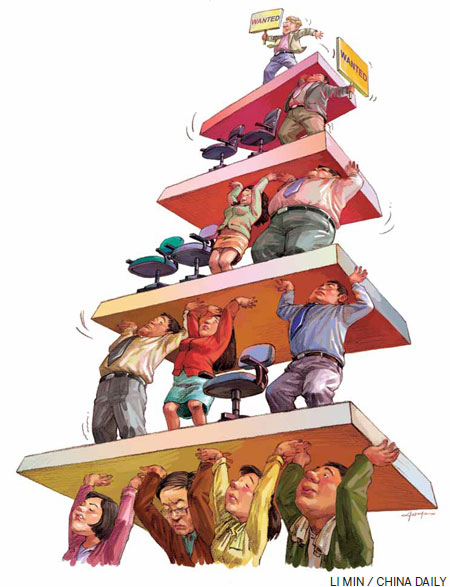Talent crunch
Updated: 2012-08-31 08:44
By Lu Chang and Li Aoxue (China Daily)
|
||||||||

Companies must find ways to retain mid-level talent rather than search for new employees in a fiercely competitive market
Gianni Serra, the Asia representative manager of ELS srl, an Italian event management company, is a worried man these days as he cannot find the "ready-to-use" talent needed to get his business up and running in China.
"The education programs in China have not kept pace with global education standards," says Serra, who is searching for Italian-
|
||||
Like Serra, many foreign enterprises and domestic firms are now finding that talent is not just the scarcest commodity in China, but one that is essential to maintain economic momentum.
At first glance, it may sound odd that in a nation of more than 1 billion people, there is a talent shortage. But that is the reality. Though there are no exact numbers to estimate the actual shortfall, it is widespread and not confined to any specific industry. Human resources still remain the most formidable challenge for the big, small and medium-sized firms in China along with the multinational and foreign companies.
More than 59 percent of the 160 China-based respondents in the PricewaterhouseCoopers' annual global CEO survey admit that hiring in China has become increasingly difficult. The survey points out that the talent shortage is spread across all sectors, with an acute shortage of senior and middle managers.
According to a study conducted by Manpower Group, 33,000 global employers found that vacancies at the managerial and executive level are more difficult to fill in China than in other countries.
Such findings have serious implications for both foreign multinationals and State-owned enterprises and private companies, especially as many of the latter are nursing global ambitions.
Arthur Yeung, academic advisor to the Executive Education Program of the China Europe International Business School (CEIBS) in Shanghai, says demand for skilled and well-educated people has outpaced the supply in China, especially after the economy has moved into the high value-added mode.
"The talent shortage in China is acute and a major source of concern for local companies and foreign multinationals," says Yeung, who is also the Philips Chair Professor of Human Resource Management. "China used to be a manufacturing-driven economy, where there are a large population of blue-collar workers and factory managers to manage the process. But ever since it shifted its focus from manufacturing to high value-added industries, the challenge of attracting and retaining staff has gone up."
"The shortage of talent could slow China's growth as productivity gains slow," he says.

 Relief reaches isolated village
Relief reaches isolated village
 Rainfall poses new threats to quake-hit region
Rainfall poses new threats to quake-hit region
 Funerals begin for Boston bombing victims
Funerals begin for Boston bombing victims
 Quake takeaway from China's Air Force
Quake takeaway from China's Air Force
 Obama celebrates young inventors at science fair
Obama celebrates young inventors at science fair
 Earth Day marked around the world
Earth Day marked around the world
 Volunteer team helping students find sense of normalcy
Volunteer team helping students find sense of normalcy
 Ethnic groups quick to join rescue efforts
Ethnic groups quick to join rescue efforts
Most Viewed
Editor's Picks

|

|

|

|

|

|
Today's Top News
Chinese fleet drives out Japan's boats from Diaoyu
Health new priority for quake zone
Inspired by Guan, more Chinese pick up golf
Russia criticizes US reports on human rights
China, ROK criticize visits to shrine
Sino-US shared interests emphasized
China 'aims to share its dream with world'
Chinese president appoints 5 new ambassadors
US Weekly

|

|










